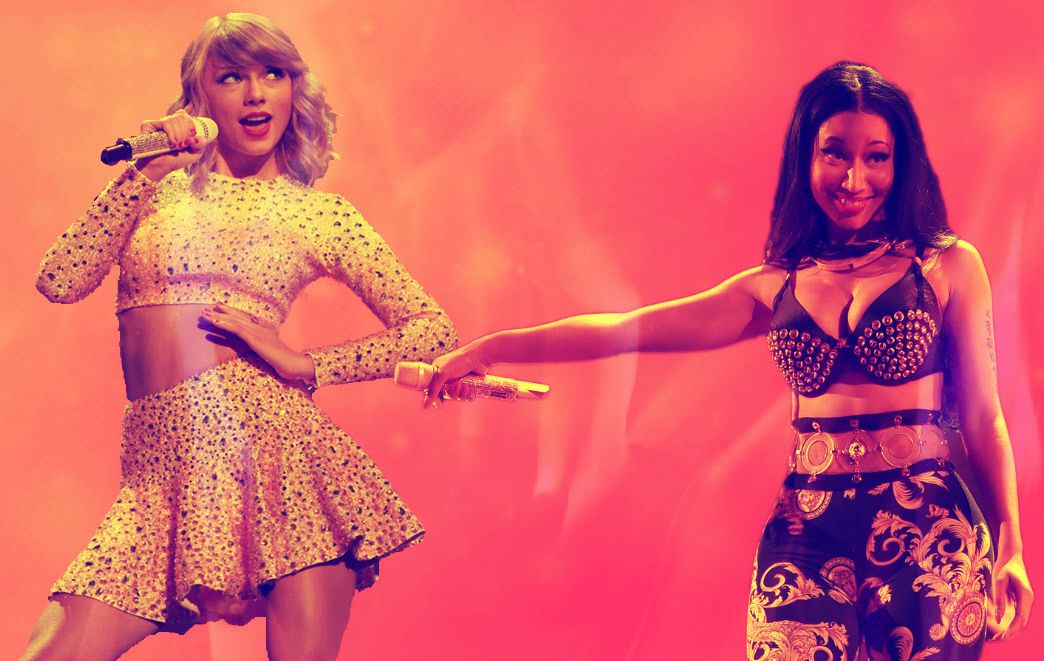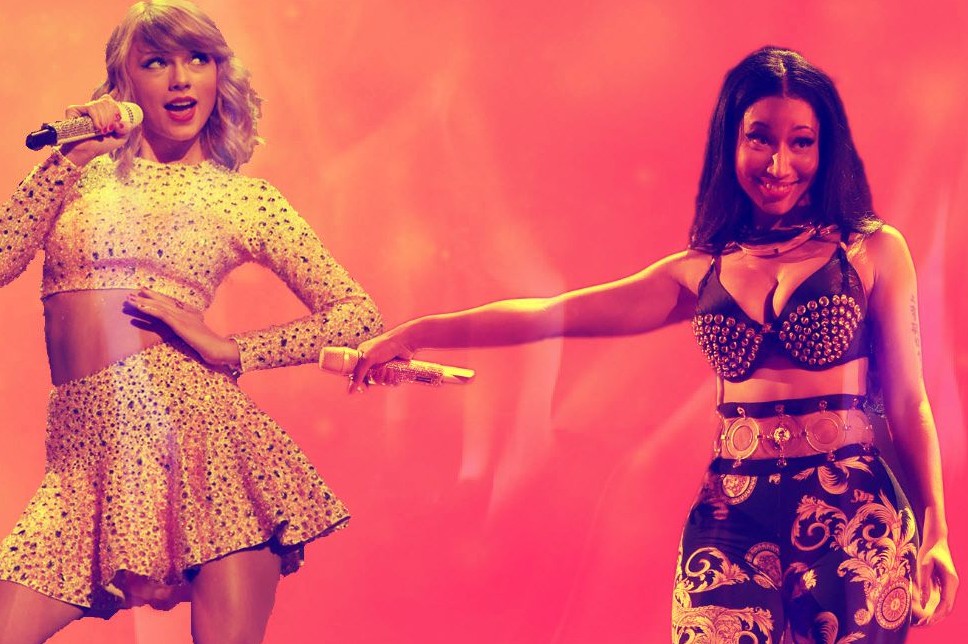LATE LOST MONTH, we – the users of the Internet – were treated to the absolute sh*tstorm that was the Nicki Minaj/Taylor Swift feud. Names were called, personal attacks were thrown about, and we have proof that at least one of the two left Twitter in tears. Fans of each artist were left thunderstruck in the aftermath of the blow-up, with both Minaj and Swift declaring each other lifelong nemeses. Women across Hollywood had to pick a side, engaging in their own quarrels with each other, sending nasty tweet after tweet after tweet. What an amazing story, right?
Well, it would be, if any of that stuff had actually happened.
What actually happened was far less interesting, which would explain why entertainment media felt it necessary to blow the story out of proportion. Minaj, feeling frustrated over her “Anaconda” music video not receiving a nomination for MTV’s Video Music Awards’s “Video of the Year” category, took to Twitter to voice her discontent. Through her tweets, she argued that because “Anaconda” had a significant cultural impact, it deserved a nomination for the category. She then went on to claim that had she been a different — “other kind,” in her words — of female artist, she would have easily received the nomination.
Following Minaj’s tweets, Swift took offense given her status as the only “other kind” of female artist represented in the category (she was joined by Beyoncé, Ed Sheeran, Mark Ronson, and Kendrick Lamar). Swift tweeted to Minaj claiming it was “unlike [her] to pit women against each other.” Minaj responded that the tweets weren’t directed towards Swift at all. Swift invited Minaj to join her on-stage should she win any awards, and two days later, apologized for the misunderstanding. Minaj replied with a thank-you to Swift.
Brutal, right?
Media outlets wasted no second rolling out stories about the epic Twitter showdown. Within the hour, social media was ablaze with individuals choosing sides and standing by one or the other. The question is… why?
The media has this funny way of capitalizing on female “feuds” and milking them for their clickability. Take, for example, the “feud” between Emma Watson and Beyoncé regarding who is the better feminist. While the feud didn’t directly involve either Watson or Beyoncé, outlets were quick to chime in to who they thought was the “better” feminist… which kind of goes against what feminism is all about. Or think back to the early 2000s, when Team Jolie and Team Aniston shirts were flying off shelves.
Why is it that these sorts of fights prove to be popular enough to warrant a surplus of coverage on them? Why do people become so invested in the idea of female celebrity versus female celebrity? While fights between famous men are occasionally reported on, they’re usually justifiable due to some sort of actionable offense having taken place. However, when it comes to women, any little tweet or Facebook post that could be interpreted as a slight towards another woman is magnified by a thousand and placed in the spotlight. Case in point: the Nicki Minaj and Taylor Swift debacle.
These sort of sexist practices do nothing for the advancement of women. Instead of celebrating women’s successes, we have articles tearing them down for not being a “good enough” feminist or negatively comparing them to others. Sure, it’s unrealistic to think women never engage in quarrels with each other, but it’s baffling that when they do, an uncontrollable media frenzy breaks out. In many cases, fights are created where they don’t even exist. “Whose side are you on?” polls go up and the Twitterverse explodes in heated disagreements.
The worst part is, Minaj had some interesting points about perceived racism in the media that were completely overshadowed by the “GIRL FIGHT!” excitement. While Minaj expressed her concerns over her lack of a “Video of the Year” nomination, the “angry black woman” archetype attached to her by various news outlets, and the failure of Tidal (which she claimed was due to racially-motivated reasons and not because Tidal is a terrible, terrible streaming service), her cries were outright ignored by most media outlets.
What will it take for the media to end the unnecessary supply of girl-against-girl action? Perhaps if consumers would stop eating it up and perpetuating the popularity of these insignificant “feuds,” we would see an end to these types of stories. Those who buy into this are ultimately harming the progression of the feminist movement. Women should be empowered and empower each other, not tear each other apart the second one so much as sneezes in another’s direction.
By: Daniel Dell-Cornejo












-300x169.jpg)




